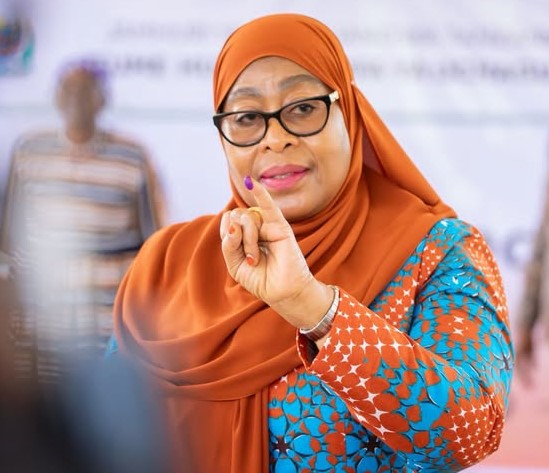
As protests sweep through Dar es Salaam, Iringa, Moshi, and Mbeya, Tanzania faces its most serious democratic test in years. A nationwide internet shutdown, low voter turnout, and opposition boycott have cast doubt on the credibility of President Samia Suluhu Hassan’s re-election bid, raising fears that Africa’s once-stable democracy is tightening its grip on power.
Dar es Salaam, October 29 — Tanzania is facing one of its most turbulent elections in recent years, as protests, curfews, and communication blackouts sweep across the nation, exposing deep fractures in the country’s democratic fabric.
Violent clashes have been reported in Dar es Salaam, Iringa, Moshi, and Mbeya, where demonstrators defied a night curfew imposed by the government from 6 pm Wednesday to 6 pm Thursday morning. Security forces were deployed to disperse crowds protesting what many see as an orchestrated electoral process designed to maintain the ruling party’s grip on power.
The unrest follows Wednesday’s general election, in which President Samia Suluhu Hassan is widely expected to retain power under the Chama Cha Mapinduzi (CCM) party, which has ruled Tanzania uninterrupted since independence in 1961.
Opposition supporters, however, say the vote offered no genuine competition. The main opposition party, Chama cha Demokrasia na Maendeleo (CHADEMA), was largely sidelined, with several of its key leaders barred from contesting or detained ahead of the polls.
“This election is Samia against herself,” said one opposition activist in Dar es Salaam before police broke up the gathering. “There is no democracy when people are afraid to choose freely.”
A Nation in Lockdown
As the tension mounted, the Tanzanian government imposed a nationwide internet shutdown, cutting access to social media and messaging platforms that citizens and journalists rely on for real-time updates.
Rights organisations swiftly condemned the move, calling it an attack on transparency and civic space.
“When the internet goes dark, so does democracy,” said a civil society leader based in Arusha. “It’s difficult to trust an electoral process when the government silences communication and imposes curfews.”
Local media outlets also reported disruptions to mobile money transactions, a critical service in Tanzania’s largely cashless economy, further fueling public frustration.
A Quiet Boycott
Across the country, polling stations saw muted turnout, especially in urban centers where opposition support has traditionally been strong. Many voters reportedly stayed home in silent protest, echoing opposition calls to distance themselves from what they described as a “predetermined” election.
In the industrial city of Mbeya, election observers said turnout was “visibly thin,” while in Moshi, residents reported seeing security vehicles patrolling near polling centers throughout the day.
For many Tanzanians, the boycott was a statement of disillusionment. “We have voted for years, but nothing changes,” said a shopkeeper in Iringa. “This time, I stayed home. It’s not worth the risk.”
The President’s Pitch
President Samia Suluhu Hassan, who took office in 2021 after the death of John Magufuli, has presented herself as a reformer and stabiliser — seeking to rebuild relations with the international community and restore investor confidence.
Her administration has introduced modest policy openings, including media reforms and outreach to opposition figures. Yet critics argue that these gestures have not translated into meaningful political freedoms.
“There was early hope that President Samia would usher in a new era of openness,” said a political analyst at the University of Dar es Salaam. “But as this election shows, the system still tilts decisively towards continuity and control.”
Regional Reverberations
Tanzania’s political direction matters beyond its borders. As one of East Africa’s largest economies and a key player in regional stability, its governance trajectory will influence neighboring states.
Analysts warn that if the government continues to stifle dissent and restrict political participation, it could embolden similar trends across the region.
International observers — many of whom faced limited access due to travel restrictions and security curbs — have called for restraint, dialogue, and respect for civil rights.
“Tanzania’s credibility on the global stage depends on how it manages this moment,” said a regional diplomat based in Nairobi. “Heavy-handed tactics could erode years of progress and investor confidence.”
Uncertain Road Ahead
As the nation awaits official election results, the atmosphere remains tense. Security forces patrol major cities, opposition figures remain under watch, and communication lines are still restricted.
For many citizens, this election feels less like a choice and more like a confirmation of power. The question now is whether Tanzania’s leaders can turn a contentious poll into an opportunity for renewal — or whether the country will slide deeper into controlled politics.
“Tanzanians have shown patience and resilience,” the analyst added. “But patience has limits. A democracy that does not listen risks breaking its social contract.”
With protests persisting despite the curfew, and a population increasingly skeptical of institutions, Tanzania’s democracy stands at a crossroads — on trial in the eyes of its people, and the world.